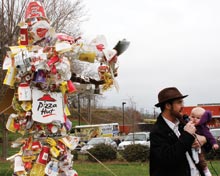A brightly colored art project of sorts, reminiscent of the Burning Man festival in Nevada’s Black Rock Desert, towered in the lot next to the McDonald’s on Merrimon Avenue. Tethered to the ground, the tall, wiry figure was adorned with every flavor of fast-food trash. Its belly was the lid of a Pizza Hut box; its head was a paper bucket that had once contained an obscenely large helping of something from Kentucky Fried Chicken. Paper bags, french-fry containers, hamburger wrappers, supersized-soda cups and chicken-nugget cartons dangled from its arms. This trash sculpture, created by UNCA students volunteering at the Dogwood Alliance, was erected to call attention to the vast amounts of paper waste generated by the fast-food industry.

The Dogwood Alliance has its headquarters in Asheville, but the nonprofit’s purview extends throughout the Southeastern United States. The group’s stated mission is to “hold corporations accountable for the impact of their industrial forestry practices on our forests and our communities.” The South is the world’s largest paper-producing region, notes Andrew Goldberg, the alliance’s director of corporate engagement, and the No. 1 paper product is packaging. Within that sector, says Goldberg, manufacturing food-and-beverage containers is the hottest thing going. “Paper packaging,” according to a fact sheet prepared by the nonprofit, “can be traced back to the clear-cutting of forests, loss of biodiversity, loss of carbon sinks that mitigate global warming, and the degradation of water quality.”
During an April 3 press event to launch “No Free Refills,” the Dogwood Alliance’s fast-food-packaging campaign, a number of speakers stood before the trash sculpture and decried what they see as the madness of wrapping fast-food orders in newly processed, nonrecycled paper that’s destined to be pitched into the trash within about 10 minutes. The name of the campaign, of course, refers not to the soft-drink dispenser at a fast-food restaurant but to the permanently impacted forest acres. It’s also the name of a new Web site created for the campaign (www.nofreerefills.org).
“I’ve been a longtime supporter of common sense,” said Joshua Martin, executive director of the Environmental Paper Network, another Asheville-based nonprofit that works closely with the Dogwood Alliance. “It doesn’t take much common sense to see how much waste is involved in packaging. … It’s a disgrace.” Martin, who held a microphone in one hand while balancing his new daughter, Cora, in his other arm, spoke about a future where fewer trees would be felled for packaging and McDonald’s would wrap its cheeseburgers in recycled paper.
McDonald’s was chosen for the campaign kickoff because it’s a leader in the fast-food industry; other targets include KFC, A&W, Taco Bell and Long John Silver’s—all of which are owned by the Louisville, Ky.-based Yum! Brands—as well as Wendy’s, Arby’s, Bojangles’ and Jack in the Box restaurants. Research connects these chains with paper companies that clear-cut millions of acres of Southern forests annually, notes Goldberg. The Dogwood Alliance aims to persuade these companies to transition to postconsumer recycled-paper packaging.
But the nonprofit doesn’t expect to win this campaign simply by planting the trash man in front of fast-food restaurants (though that gimmick does get people to start asking questions). Instead, Dogwood is using a strategy that’s proved effective in the past: By getting a critical mass of consumers to tell companies that they’d rather be buying postconsumer recycled paper, they convince corporate leaders that they can gain a competitive edge by introducing environmentally friendly paper-purchasing policies. In 2002, the Dogwood Alliance used this approach to persuade Staples—a high-profile office-supply store—to begin offering products containing postconsumer recycled paper and to reject products derived from endangered Southern forests. According to the agreement, the recycled-paper products will account for an average of 30 percent of the company’s paper-product offerings. After that initial victory, it didn’t take long to persuade other big-box office retailers, such as Office Max, to follow suit.
“We’re not telling anyone not to eat at McDonald’s,” Dogwood Alliance Development Director Michelle Smith noted at the press event. Instead, she said, “We’re calling on these 11 companies to be better corporate stewards.”


It’s ridiculous to find out that Southern forests–the most biodiverse temperate forests in THE world–are being used to make packaging for fast food companies. Thanks for writing such a great article, Rebecca!
i know it’s a metaphor for the destruction of our forests…but i do find it ironic that the policy of ‘free refills’ does usually equate to a short-term recycling of that cup for a second go-around.
i.e. nobody is really arguing that they shouldn’t offer free refills. just that we won’t be getting a free refill of our forests.